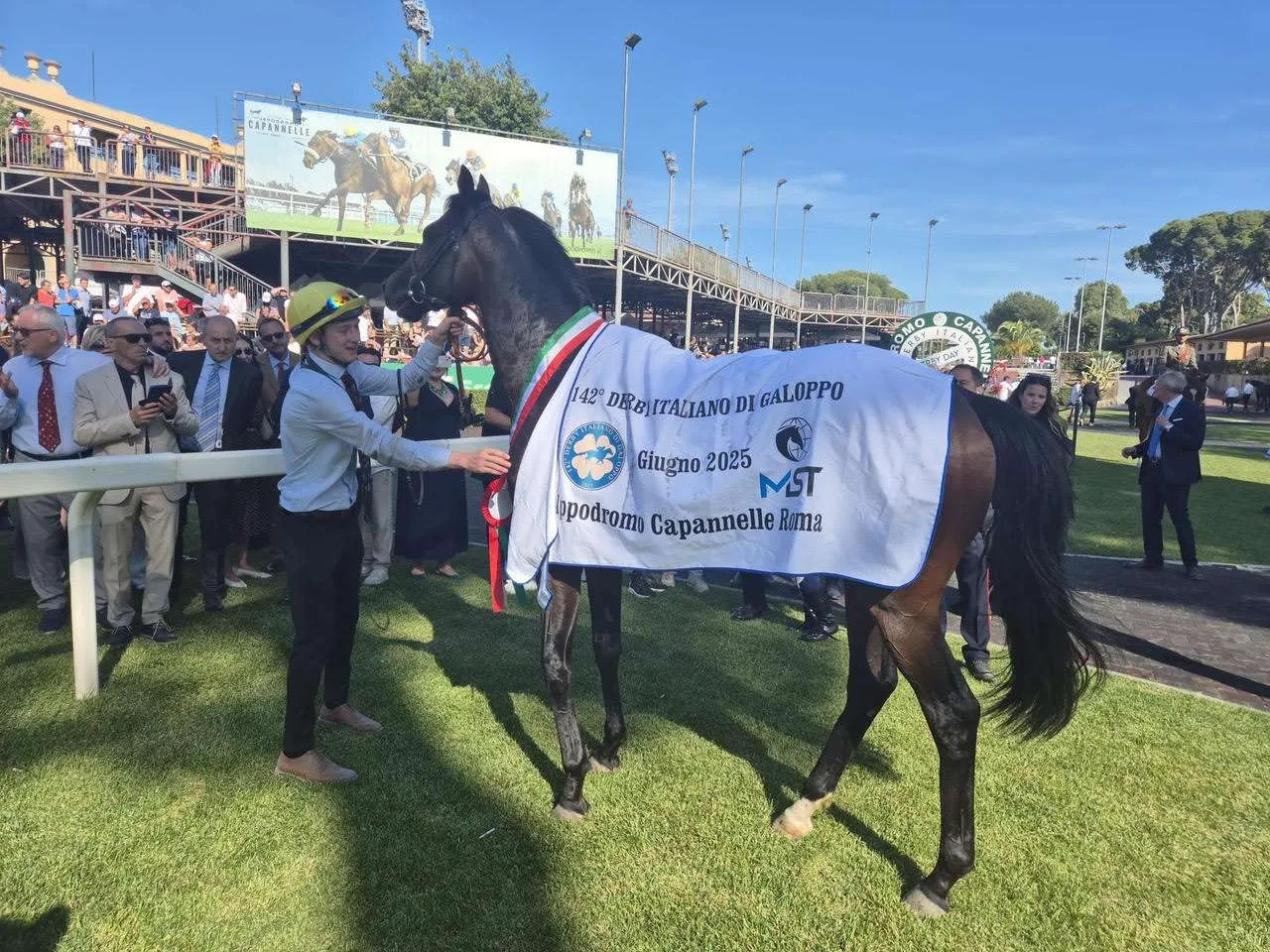Jannik Sinner, the world’s highest-ranked men’s tennis player, might be doing his bit for Italian sport, but the national football team, which unites the country like nothing else, is on a downturn that might make the racing industry feel positively optimistic about its own health.
Only Brazil have won more World Cups than the Azzurri, which have humiliatingly missed the last two editions of that particular jamboree and recently fell to a chastening 3-0 defeat at the hands of Norway – a result that meant manager Luciano Spalletti was heading for the exit door.
His experience in dealing with that crisis may have made him an ideal candidate to cross over into racing in Italy, which has been in a sorry state in recent years but is showing some signs of recovery.
 Indeed, Remo Chiodi (left), the government minister in charge of things, is on the front foot, insisting “an intense renewal process is underway”.
Indeed, Remo Chiodi (left), the government minister in charge of things, is on the front foot, insisting “an intense renewal process is underway”.
Luca Cumani, the celebrated Italian trainer who made his name in Newmarket, does not go quite so far, but reckons “it’s a bit better than five years ago, although there’s still a long way to go”, while Marco Botti, who is also based in Suffolk, was encouraged by the crowd at Capannelle racecourse in Rome for June’s Derby Italiano, which he landed with Molveno.
“It looked packed and that was nice to see,” says the trainer whose raider trousered just over £240,000. In 2009, when the Milan-born Frankie Dettori – arguably the sport’s most recognisable face worldwide – captured the race on the Saeed bin Suroor-trained Mastery for Godolphin it offered nearly £360,000 to the winner despite it being staged as a Group 2 for the first time.
That is around the period things spiralled into decline in a nation that boasts a proud racing history through the likes of legendary owner-breeder Federico Tesio, whose masterpiece Ribot’s unblemished 16-from-16 career included two triumphs in the Prix de l’Arc de Triomphe alongside success in the King George VI and Queen Elizabeth Stakes.
Tesio, unique among owner-breeders in that he trained his horses, was also responsible for Nearco, one of the most influential stallions of all time whose son Nearctic was the sire of Northern Dancer, who, in turn, fathered Sadler’s Wells (among many other game-shapers), which, of course, led to the similarly exalted Galileo.
However, by 2019, the country had lost all of its Group 1 contests when the Premio Lydia Tesio, named in memory of the wife of the greatest single figure in the history of Italian racing, was demoted to Group 2 status.
The reasons why Italy is now regarded a second-tier racing jurisdiction – despite still regularly producing proficient horsemen – are manifold.
Poor administration and lack of confidence in governance is something Botti, who hails from one of the foremost racing dynasties in his homeland, identifies as a contributing factor.
Cumani, experienced in industry politics through his time on the BHA Board, backs a recent reduction in betting tax to bring it into line with other sports. “A gambler is a gambler, but a gambler is also smart enough to know where he can make the most money,” he reasons.
For bloodstock agent Valfredo Valiani, the legalisation of sports betting has lured racing punters elsewhere. He has worn many hats during his career and saddled Electrocutionist to win the Juddmonte International in 2005. He says: “Some thought that would be better for racing because it would bring in new people who’d gamble on it, but I was President of the trainers’ federation and thought, like many, it was very dangerous.
“I thought they would bet more on other sports and less on racing, which is what happened.”
A reduction in foal numbers and image problem – “we’re perceived to have a dirty face but the face is actually pretty good; it’s just got some dust on it,” according to Valiani – are other roots of the problem, but, unsurprisingly, slow payments of prize-money have played a crucial, crippling part too.
“I can’t imagine us recommending any of our owners to take a horse to Italy,” Gill Headley, financial director for Mick Channon when he trained, said in 2014.
Something is being done, though.
“Talking to different people on Derby day, it sounds like the issue they had with slow payments is speeding up,” explains Botti. “That would be a positive thing for sure and the most important thing for overseas owners and trainers.
“There is no doubt they look after owners at the track, but everyone was concerned about when they’d get paid. As far as I know, they’re paying much quicker. Even if it’s up to 90 days and you know you’ll get paid, that’s fine because you didn’t have a clue before.”
Cumani senses that upswing too and Chiodi, an engineer by trade who oversees the sport through his role as General Manager of the Italian Ministry of Agriculture, Food Sovereignty and Forests (Masaf), is committed to improving the problem along with everything else.
“The reason for the Italian decline is due to a combination of factors,” he says. “First of all, especially in the past, the lack of a strategic long-term vision for the industry to address the changing of society and deal with animal welfare issues. This meant an absence of marketing strategy and campaigns, downgraded black-type races, a sharp reduction in foal crops, especially long delays in prize-money payments, and lack of generational turnover within the stakeholders and racegoers.
“But there is a clear and genuine effort by Masaf to drive meaningful reform across the sector and there’s strong political support for it.
“In 2023 the Italian government began a structural reform to make horseracing an economic resource for the country, considering the relevant role that this sector can play in the development of an advanced nation.”
Detailing some of the progress that has been made, he continues: “Prize money payments are becoming faster, regulations are being modernised, betting taxes have been reduced, a two per cent additional tax on virtual betting has been introduced, a VAT reduction on the purchase of yearlings has been approved, and important investments are being made in racetracks. Last but not least, the extra resources ensured to horseracing in the government financial law for year 2025 were approved by parliament at the end of December 2024.”
Chiodi’s agency took over governance of Italian racing in 2011, replacing Unire (Union Nazionale Incremento Razze Equine), which was then the national authority and something resembling a traditional Jockey Club.
Botti acknowledges bureaucratic delays back home are not limited to racing and is generally “an Italian thing”, while Valiani feels stepping away from government rule is needed.
“Now, to change the rules of racing, you almost have to make a law, which takes ages – if you want to know if your horse is qualified for a race you might never get an answer if you ask the ministry,” he half-jokes, but Chiodi does recognise “significant challenges” to the existing system.
there is a goal for an average prize-money increase of 15 per cent next year.
He too notes the “bureaucratic constraints and limited flexibility compared to privately run models in other countries”, issues he seeks to “overcome through a major reform toward establishing a semi-private company or agency, as seen in France or the UK”.
While reducing prize-money payment delays to fewer than 75-90 days, increasing transparency, and updating welfare and doping rules are “short-term” aims, raising average prize-money, stimulating Italian breeding and sales, and creating a new organisational body are “medium-term” goals, for Chiodi, who believes its implementation “would allow for independent, professional governance with clear accountability and operational efficiency”.
He adds: “It could attract private investment, enhance credibility with international partners and adapt more quickly to industry trends – something Italy’s ministry-led system currently struggles with,” revealing upcoming networking events are planned in London and at Newmarket’s July meeting.
Longer term, restoring Group 1 races in Italy is, in Chiodi’s words, realistic but only with sustained progress – something that would also assist the objective of regaining Italian racing’s reputation abroad.
Compared to football, racing in Italy “pales into insignificance”, Cumani opines, while Valiani bemoans the diminished media coverage.
Chiodi feels the launch of streaming service Grande Ippica Italiana has been a useful addition for those wanting to follow the action but agrees the link between the sport and public has been lost.
“Racing retains a cultural and historical presence, particularly in local communities through traditional events and strongly rooted races, but its mainstream popularity has declined,” he goes on. “The government’s aim is to Remo Chiodi: ‘renewal process underway’ reconnect racing with the public through transparency, communication and modernisation.”
Buoyed by the 15,000-strong crowd for the Derby Italiano – “a remarkable result for an Italian racecourse” – Chiodi believes other metrics can illustrate the darkest days might be in the past.
“Some indicators show early recovery,” he says. “For example, foal numbers rose from a low of 422 in 2018 to 556 in 2023, and an additional 130 foals were bred abroad by Italian breeders.”
VAT on yearlings, meanwhile, was reduced from 22 per cent to five per cent, €10–12 million in additional prize money is expected from the new virtual betting tax, and there is a goal for an average prize-money increase of 15 per cent next year.
Some of those improvements for Valiani, a former amateur jockey who trained for 25 years, are “too small” but he stresses: “I’m an optimistic person and I’m optimistic for racing because I know the potential of racing in Italy.
“I hope people in Italian racing can get together and look for the day after tomorrow and not just today.”
That outlook might be welcomed by Chiodi, who maintains “one of the greatest challenges is the mindset within the racing community” because “many insiders lack optimism and resist change”.
For those in Italian racing, there have been many reasons to lack optimism, but – if Chiodi’s plans come off – further change in the sport’s fortunes could easily be in the offing.
